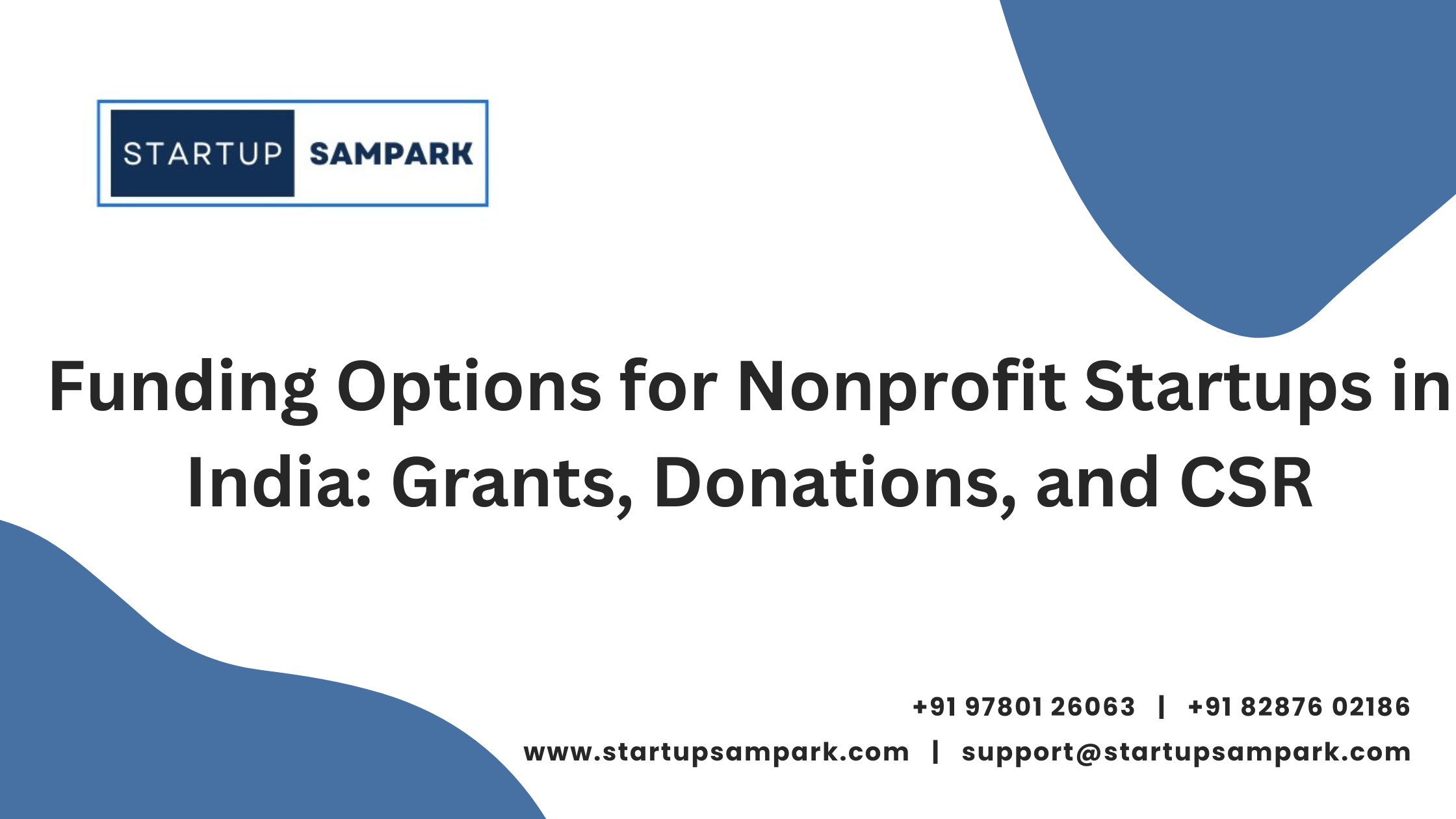Funding Options for Nonprofit Startups in India: Grants, Donations, and CSR
Funding Options for Nonprofit Startups in India
Nonprofit startups in India face unique challenges when it comes to funding, as they do not operate for profit and rely heavily on external financial support to carry out their missions. These organizations often need to tap into various funding sources, including grants, donations, and corporate social responsibility (CSR) contributions. Understanding these options can help nonprofit startups access the capital they need to expand their reach, deliver their services effectively, and make a lasting social impact. Each funding option has specific eligibility criteria and guidelines, and nonprofits must choose the ones that align best with their goals and legal framework.
Government Grants and Schemes for Nonprofits
The Indian government provides a range of grants and schemes designed to support nonprofit startups, particularly those working in sectors such as education, healthcare, poverty alleviation, women’s empowerment, and environmental conservation. These grants are often offered by various ministries, departments, and government bodies, such as the Ministry of Social Justice and Empowerment, the Ministry of Women and Child Development, and the Ministry of Environment, Forests and Climate Change.
Nonprofits can apply for government funding through these schemes by meeting specific eligibility criteria, submitting detailed proposals, and adhering to compliance standards. Government grants are usually project-based, meaning that the funds must be used for a specific purpose outlined in the application. Nonprofits must demonstrate the impact and sustainability of their programs to increase their chances of receiving government support. These grants can be highly competitive but offer significant financial support for social causes.
-
 Startup Registration (DPIIT Recognition)₹8,850.00
Startup Registration (DPIIT Recognition)₹8,850.00
Donations from Individuals and Philanthropists
Donations from individuals, philanthropists, and the general public are one of the most common sources of funding for nonprofit startups in India. Nonprofits can encourage donations through fundraising campaigns, events, online platforms, and direct appeals to potential donors. In India, individuals and corporations can benefit from tax exemptions for donating to registered charitable organizations, which provides a powerful incentive for donors to contribute.
Nonprofit organizations can also establish donor programs or membership schemes to create a network of regular supporters who make ongoing contributions. Many nonprofits have successfully leveraged crowdfunding platforms to raise significant amounts of money from a large pool of small donors, especially for specific projects or emergencies. To increase trust and transparency, nonprofits should ensure that their financial records and donation usage are publicly accessible and clearly communicated to donors.
Corporate Social Responsibility (CSR) Contributions
Under the Companies Act, 2013, Indian companies are mandated to contribute a percentage of their profits toward Corporate Social Responsibility (CSR) initiatives. This has opened up a significant funding avenue for nonprofit startups, especially those working on projects related to education, healthcare, rural development, and sustainability. CSR contributions from businesses are a vital source of support, allowing nonprofits to expand their reach and achieve their objectives.
Nonprofits seeking CSR funding must align their activities with the priorities of companies’ CSR policies. These priorities are often centered on social causes like skill development, community health, environmental sustainability, and poverty alleviation. To attract CSR funding, nonprofits need to demonstrate the social impact of their work, maintain transparency in fund utilization, and provide regular reports on the progress of their projects. Collaborations with businesses through CSR initiatives can also enhance the visibility and credibility of nonprofits, helping them gain broader support.
Crowdfunding and Online Fundraising Platforms
In recent years, crowdfunding and online fundraising platforms have become essential tools for nonprofit startups in India to raise funds. Platforms such as Ketto, Milaap, ImpactGuru, and GiveIndia enable nonprofits to create fundraising campaigns and reach a wide audience, both domestically and internationally. These platforms allow nonprofits to tell their stories, present specific fundraising goals, and receive small or large donations from individuals who are interested in supporting their cause.
Crowdfunding is particularly useful for specific projects, such as building a school, conducting health camps, or addressing natural disasters. Nonprofits can share their campaigns on social media and other online channels to maximize outreach and attract more donors. To be successful, nonprofits need to create compelling narratives and engage with their donors throughout the campaign to ensure trust and accountability. Regular updates and transparency about how funds are being used can help maintain long-term donor relationships.
Partnerships with International Organizations and Foundations
Nonprofit startups in India can also explore funding opportunities through international organizations and foundations that support social causes globally. These organizations often provide grants, sponsorships, and partnerships to local nonprofits that align with their mission and vision. Foundations such as Bill & Melinda Gates Foundation, Ford Foundation, Tata Trusts, and Rockefeller Foundation are known for funding projects that focus on public health, education, poverty alleviation, and environmental sustainability.
To access funding from international organizations, nonprofits must ensure that they meet the specific application and eligibility requirements. This may include submitting detailed project proposals, demonstrating a proven track record of impact, and adhering to international compliance standards. Partnerships with international organizations can help nonprofits scale their impact, gain access to global networks, and leverage technical expertise and resources to achieve their goals.
Startup, India
-
 Startup Registration (DPIIT Recognition)₹8,850.00
Startup Registration (DPIIT Recognition)₹8,850.00















Post Comment